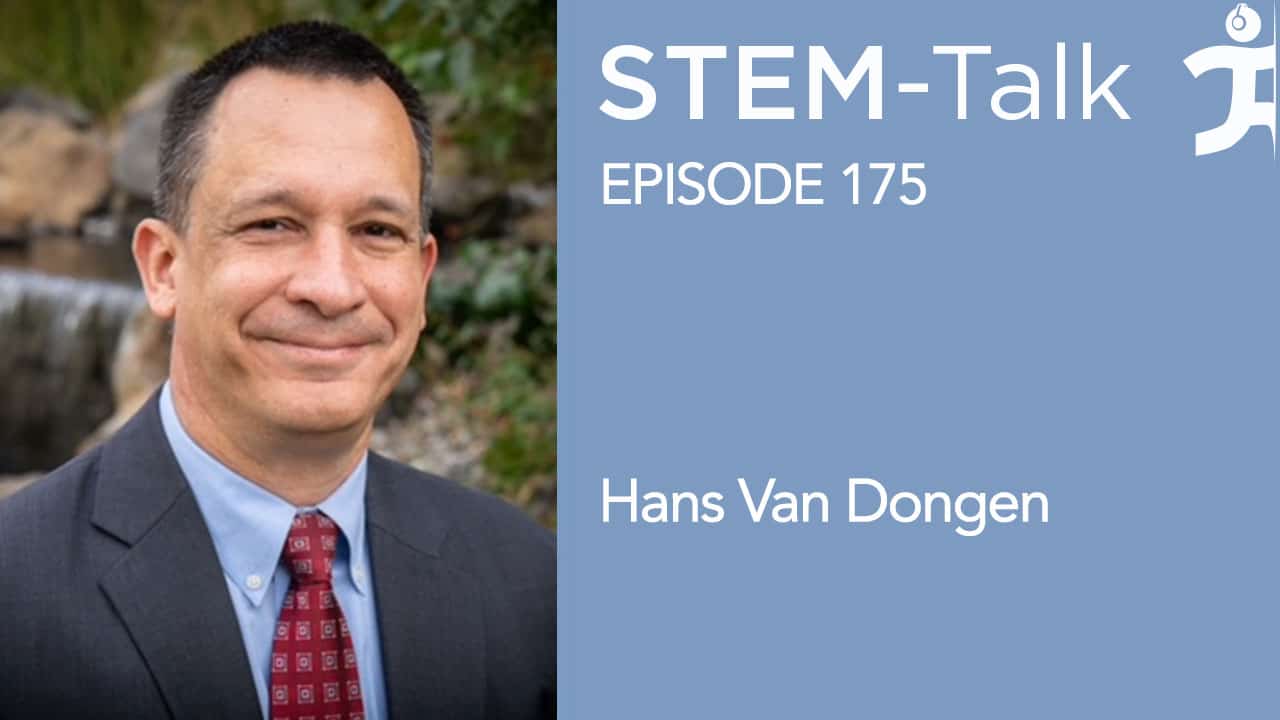STEM-Talk
Episode 175: Hans Van Dongen on how fatigue and sleep loss lead to cognitive deficits
// Nov 27, 2024

Today we have Dr. Hans Van Dongen, director of the Sleep and Performance Research Center at Washington State University in Spokane. Dr. Kevin Gluck, a senior research scientist at IHMC, joins Dr. Ken Ford to interview Hans about his studies on inter-individual differences in vulnerability to fatigue as well as the cumulative cognitive deficits that follow chronic sleep restriction.
Hans is known for his mathematical modeling of fatigue’s effects on performance. At the Sleep and Performance Research Center, Hans and his colleagues investigate how sleep loss and circadian misalignment impact brain function, cognition and behavior.
Show notes:
[00:02:50] Kevin opens the interview by asking Hans about his childhood growing up in The Netherlands. [00:03:23] Ken asks Hans what he was like as a kid. [00:03:50] Kevin mentions Hans’s father was a math and science teacher and wonders if that influenced Hans’ interest in science. [00:04:48] Hans talks about attending Leiden University and explains why he majored in astrophysics. [00:06:09] Hans shares how working in a psychophysiology lab put him on a path to specialize in sleep research. [00:08:00] Hans talks about how he was part of a study that proved the morning-evening chronotype was a biological trait, rather than a psychological one. [00:09:55] Ken asks Hans what led him to take a post-doc position at the University of Pennsylvania. [00:11:22] Hans explains what led him to move from the University of Pennsylvania to Washington State University. [00:13:36] Ken mentions that The Sleep and Performance Research Center, where Hans serves as the director, is a coalition of basic and applied research laboratories that aim to understand the neurobiology of sleep and sleep loss. Ken goes on to mention that Hans and his colleagues investigate sleep and biological rhythms, and their impact on health and performance. Kevin asks Hans to give an overview of what sleep loss is and the effect it has on our metabolism, immune system, and cognitive performance. [00:15:57] Kevin mentions Hans’ recent paper which investigated how circadian misalignment due to night shift work has been associated with an elevated risk of chronic disease. The paper demonstrated that just a few days of being on a night shift schedule throws off protein rhythms related to blood glucose regulation, energy metabolism, and inflammation. Kevin asks Hans to talk more about the findings. [00:21:18] Ken asks how long it takes for a person’s circadian rhythm to normalize after ceasing to work night shifts. [00:22:13] Kevin brings up Hans’ paper on the continually operating neurobiological mechanisms of homeostatic and circadian processes and their effects on neurobehavioral performance. Before asking about the paper itself, Kevin asks Hans to give an overview of the homeostatic process and its relationship to the circadian process. [00:24:14] Ken notes that the bio-behavioral function and evolutionary advantage of the circadian process is widely recognized, but that the neurobiology of the homeostatic process and its effects on performance are still poorly understood. In a 2011 paper, Hans attempted to shed light on the underlying mechanisms of the homeostatic process to provide an explanation for why the buildup of homeostatic pressure resulting from sleep loss leads to instability in vigilant attention. To explore this, Hans first explored the time-on-task effect. Ken asks Hans to explain the time-on-task effect and its role in cognitive performance. [00:27:06] Kevin brings up the “local sleep hypothesis,” which attempts to explain the time-on-task effect. According to the local sleep hypothesis, groups of neurons involved in performing a task will “fall asleep” as a homeostatic consequence of sustained use, which leads to an interruption in information processing, leading to impaired performance. Kevin asks Hans what empirical and scientific evidence exists for the hypothesis. [00:32:03] Ken explains that working all hours of the day and suffering chronic sleep restriction, and at times sleep deprivation, has become normalized in our society. In light of this, Ken asks what impacts sleep deprivation and sleep restriction have on the cognitive performance and overall health. [00:34:02] Ken asks Hans to elaborate on the fact that sleep deprivation is particularly problematic and potent with regards to decision-making when circumstances are uncertain or unexpected. [00:38:40] Ken asks Hans what his thoughts are on stimulant use for workers and operators who need to stay awake for extended periods. [00:41:43] Hans discusses how contrary to popular belief, even modest amounts of sleep loss can have negative impacts on cognitive and physical performance. [00:46:40] Kevin asks Hans about the common belief that people can adapt to chronic sleep restriction. [00:49:29] Hans describes his work with the Psychomotor Vigilance Test (PVT), which requires participants to respond as quickly as possible to a stimulus that appears at random intervals. [00:52:46] Kevin mentions that Hans published a review paper in 2019 with Amanda Hudson and Kimberly Han in Neuropsychopharmacology. This paper points out that research on sleep deprivation, vigilant attention, and brain function may help determine the fixed connections and malleable connections between specific neuronal pathways involved in specific cognitive processes. [00:56:22] Ken mentions that to better understand the neurocognitive effects of sleep deprivation, Hans performed a study that evaluated the strategy of ‘catching up on sleep’ a practice many people engage in during periods where sleep restriction is inevitably followed by abundant free time. Ken asks Hans to discuss the design of this study and its findings. [01:06:41] Kevin pivots back to Hans’ study on sleep restriction and deprivation. According to the study, a person who is chronically sleep deprived experiences diminishing performance, and if that person undergoes sleep deprivation by skipping a night of sleep, their performance further diminishes. However, a person would see their performance recover within a few days of restricted sleep following sleep deprivation. Kevin asks Hans to expand on these findings. [01:10:52] Kevin asks Hans to clarify some terminology regarding sleep health, as well as explain how someone at home can assess their own sleep health. [01:15:13] Ken asks Hans what his sleep schedule is like. [01:19:22] Ken mentions that Hans was recently featured in a news article about the dreaded ‘mid-day slump’ of energy. Ken goes on to explain that while it is commonly believed that the mid-day slump can be attributed to eating lunch, Hans argues that it is the result of a gap between the circadian clock and the homeostatic clock as a result of inadequate sleep. Ken asks Hans to elaborate. [01:23:36] Ken asks if Hans thinks that the poor metabolic health of many people in North America also contributes to the mid-day slump. [01:25:19] Ken asks Hans to think of the biggest lessons he has learned about science and life during his career. [01:29:14] Kevin mentions that Hans and his wife enjoy traveling together, but that his wife has a bit of a complaint about these travels. [01:30:59] Following up on the topic of travel, Ken asks Hans how he manages jet lag. [01:34:56] Ken recommends for listeners, an app called Timeshifter for managing jet lag. [01:35:04] Ken, Kevin and Hans wrap up the interview talking about jet lag.Links:






